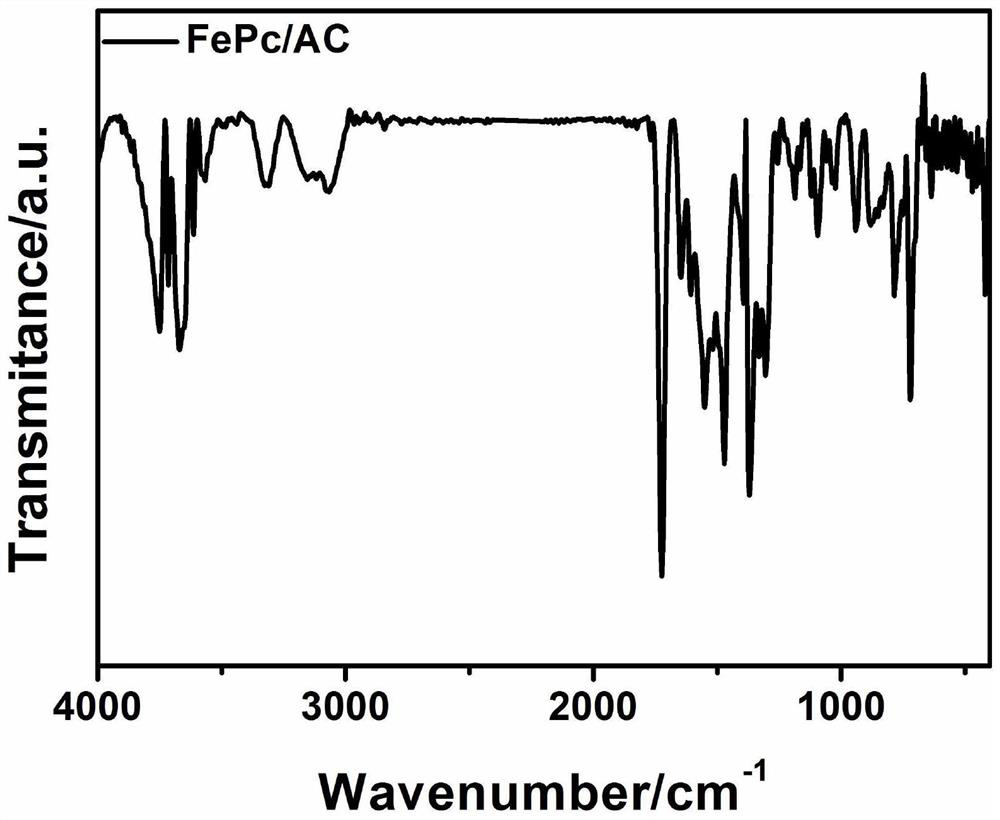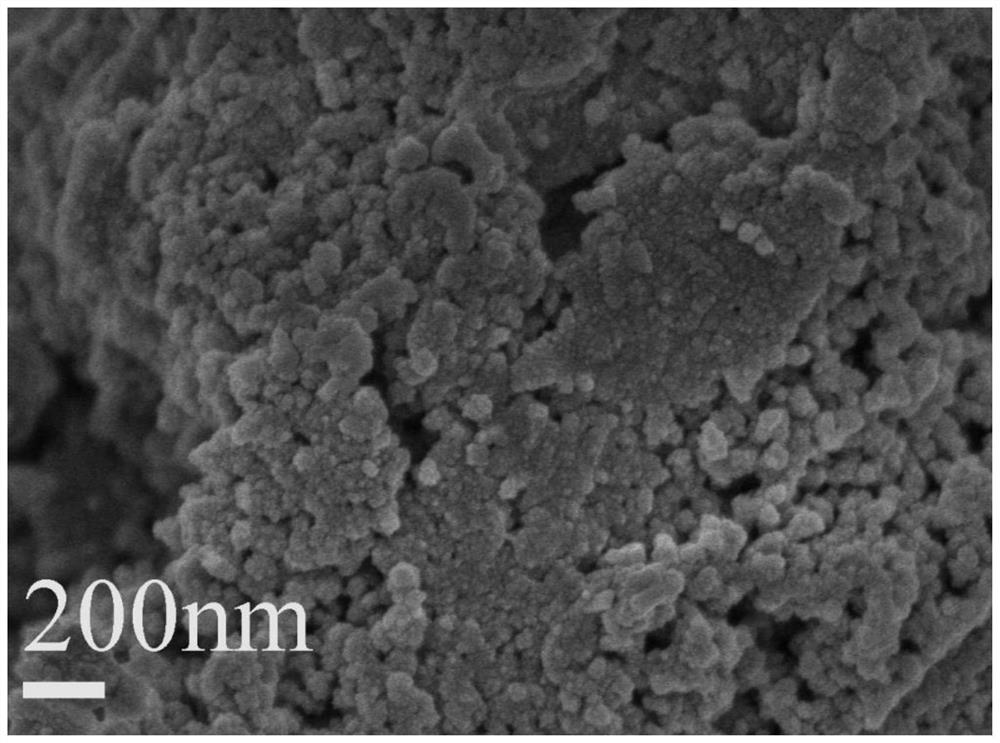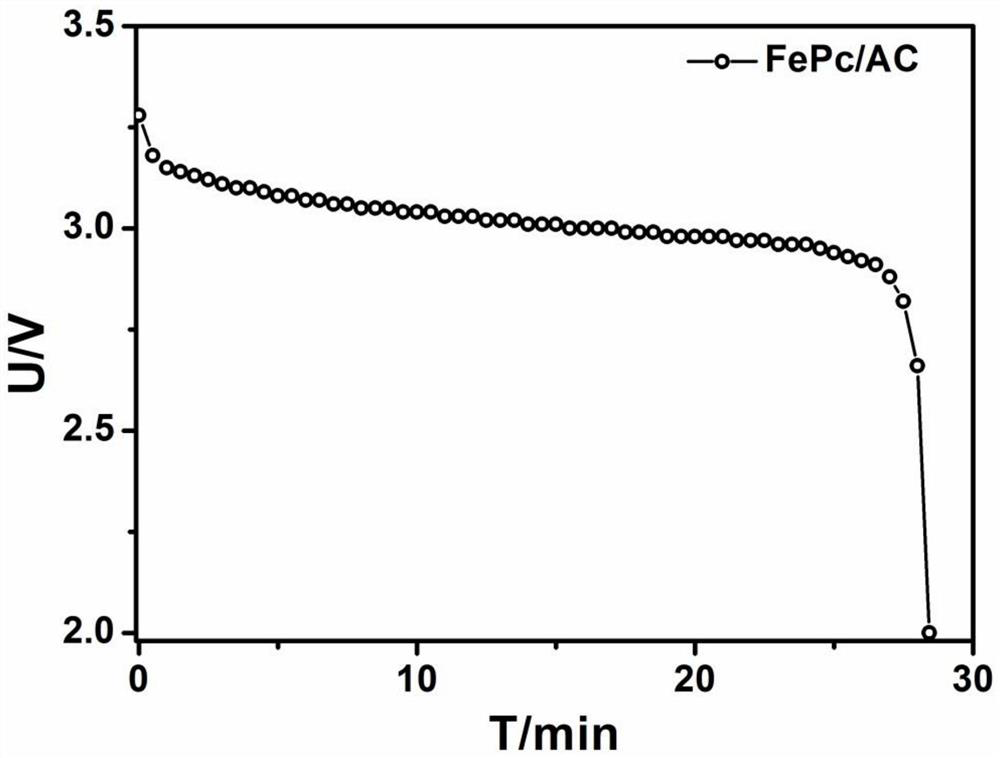A kind of iron phthalocyanine/activated carbon li/socl 2 Preparation method of battery cathode catalyst material
A battery positive electrode and catalytic material technology, applied in battery electrodes, non-aqueous electrolyte batteries, circuits, etc., can solve the problems of short synthesis cycle, low cost, and good dispersion
- Summary
- Abstract
- Description
- Claims
- Application Information
AI Technical Summary
Problems solved by technology
Method used
Image
Examples
Embodiment 1
[0023] A kind of iron phthalocyanine / activated carbon Li / SOCl 2 A method for preparing a positive electrode catalyst material for a battery, comprising the following steps:
[0024] Step 1: Take 0.819g of phthalic anhydride and 0.1g of specific surface area of 1400m 2 / g of pitch coke activated carbon is placed in a glass mortar and mixed evenly to obtain a mixture;
[0025] Step 2: Put 0.6g of urea, 0.03g of ammonium molybdate and 0.5g of ferrous ammonium sulfate hexahydrate into a glass mortar and mix them with the mixture and grind them thoroughly, then put them into a ceramic crucible and place them in a muffle In the furnace, the temperature was raised from room temperature to 120°C at a rate of 10°C / min and kept for 0.5h; then the temperature was raised to 140°C at a rate of 5°C / min and kept for 0.1h; Sinter at 250°C and hold for 2 hours to obtain a sintered product;
[0026] Step 3: Cool to room temperature, soak the sintered product with deionized water for 12 hou...
Embodiment 2
[0028] A kind of iron phthalocyanine / activated carbon Li / SOCl 2 A method for preparing a positive electrode catalyst material for a battery, comprising the following steps:
[0029] Step 1: Take 0.819g of phthalic anhydride and 0.1g of specific surface area of 1400m 2 / g of pitch coke activated carbon is placed in a glass mortar and mixed evenly to obtain a mixture;
[0030] Step 2: Put 1.2g of urea, 0.12g of ammonium molybdate and 1g of ferrous ammonium sulfate hexahydrate into a glass mortar and mix them with the mixture and grind them thoroughly, then put them into a ceramic crucible and place them in a muffle furnace From room temperature to 120°C at a rate of 10°C / min and hold for 0.2h; then at a rate of 10°C / min to 130°C and hold for 0.1h; then at a rate of 10°C / min to 270 ℃ and keep it warm for 2h for sintering to obtain a sintered product;
[0031] Step 3: Cool to room temperature, soak the sintered product with deionized water for 12 hours each time, and change t...
Embodiment 3
[0036] A kind of iron phthalocyanine / activated carbon Li / SOCl 2 A method for preparing a positive electrode catalyst material for a battery, comprising the following steps:
[0037] Step 1: Take 0.41g of phthalic anhydride and 0.05g of specific surface area of 1400m 2 / g of pitch coke activated carbon is placed in a glass mortar and mixed evenly to obtain a mixture;
[0038] Step 2: Put 0.6g of urea, 0.03g of ammonium molybdate and 0.8g of ferrous ammonium sulfate hexahydrate into a glass mortar and mix them with the mixture and grind them thoroughly, then put them into a ceramic crucible and place them in a muffle In the furnace, the temperature was raised from room temperature to 125°C at a rate of 5°C / min and kept for 0.5h; then the temperature was raised to 150°C at a rate of 10°C / min and kept for 0.1h; Sinter at 260°C and hold for 1.5h to obtain a sintered product;
[0039] Step 3: Cool to room temperature, soak the sintered product with deionized water for 8 hours e...
PUM
| Property | Measurement | Unit |
|---|---|---|
| specific surface area | aaaaa | aaaaa |
Abstract
Description
Claims
Application Information
 Login to View More
Login to View More - R&D
- Intellectual Property
- Life Sciences
- Materials
- Tech Scout
- Unparalleled Data Quality
- Higher Quality Content
- 60% Fewer Hallucinations
Browse by: Latest US Patents, China's latest patents, Technical Efficacy Thesaurus, Application Domain, Technology Topic, Popular Technical Reports.
© 2025 PatSnap. All rights reserved.Legal|Privacy policy|Modern Slavery Act Transparency Statement|Sitemap|About US| Contact US: help@patsnap.com



